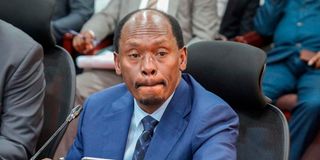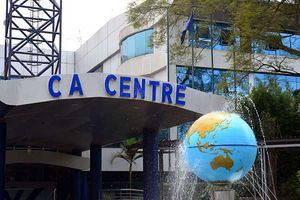
ICT Cabinet Secretary William Kabogo when he appeared before the Senate ICT Committee at Bunge Tower on March 18, 2025.
ICT Cabinet Secretary William Kabogo was on Thursday confronted by MPs over his arbitrary decision to switch off the signals of three local TV stations, which was not based on any legal grounds.
CS Kabogo, who was appearing before the Delegated Legislation Committee of the National Assembly, was at pains to justify the action. He was unable to quote the relevant section of the law that supported his directive to switch off NTV, KTN and K24 TV stations.
Initially, CS Kabogo, while responding to Kathiani MP Robert Mbui on why he ordered the off-air switch of the TV stations, said that his action was informed by the violent scenes during the June 25, 2025, demonstrations that saw over 20 Kenyans and others injured in bloody confrontations with heavily armed police officers.
“The main reason for switching off the TV stations was within the parameters of the watershed hours. There was a lot of violence and when the committee responsible made the advice to me, the action was taken,” CS Kabogo told the committee chaired by Ainabkoi MP Samuel Chepkong’a.
Article 34 of the constitution grants freedom of the media practice in Kenya from state interference.
However, when Mr Mbui challenged CS Kabogo why he never bothered to switch off the TV stations as they beamed live the scene of two police officers shooting a facemask hawker on the streets at close range after assaulting him, CS Kabogo was tongue-tied.
The facemask hawker would later die from the gunshot, days after he had been declared “brain dead” by the doctors.
“Do you really have the power to switch off the TV stations? If yes, under what law?” posed Mr Mbui, adding, “There was a hawker who was captured on live TV being shot by two armed police officers. Wasn’t that violence?”
“Why didn’t you switch off the TV stations if your explanation is anything to go by?”
At this point, Mr Chepkong’a, a lawyer, told the CS that no law gives him the power to switch off TV stations.
“You may have invoked certain powers that do not exist in law,” Mr Chepkong’a told the CS, adding, “It is only parliament under Article 94 of the constitution that can make anything that has the force of law, and so far, we haven’t done that.”
Cornered, CS Kabogo took refuge in clause 11 of the code of conduct for media practice in Kenya, which is still under consideration before the committee.
Nonetheless, the clause proposes, “a media enterprise shall incorporate a minimum seven-second delay in live broadcasts to prevent the unintended publication of material that violates this Code.”
But Mathare MP Anthony Oluoch reminded the CS that whatever he was relying on to justify his action was foreign to the law.
“You will need to situate whatever you are saying in the law. Otherwise, your actions are not covered in any law,” said Mr Oluoch, with Kilgoris MP Julius Sunkuli also weighing in.
“The things the CS did do not exist in the current laws. Let him situate them in the law,” said Mr Sunkuli.
With the MPs’ lecture, CS Kabogo did not have any other choice but to accept that his move to switch off the TV stations was strange to the laws of the land.
“As Hon Oluoch has said, we should be able to put it clearly in law the circumstances under which the switching off of TV stations can happen,” CS Kabogo caved in.
On the material day, Communications Authority of Kenya (CA) Director-General David Mugonyi had warned all TV and Radio stations against the continued live coverage of demonstrations.
Mr Mugonyi went on to cite Articles 33 (2) and 34 (1) of the constitution and section 46 (1) of the Kenya Information and Communications Act (KICA).
“This is therefore to direct all television and radio stations to stop any live coverage of the demonstrations forthwith. Failure to abide by this directive will result in regulatory action as stipulated in the Kenya Information and Communications Act,” Mr Mugonyi had warned.








